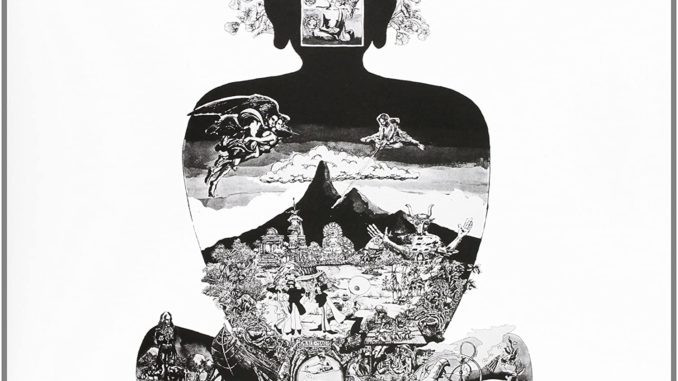
When heavy metal was still in its infancy, before it was even a genre really, it was already assimilating new sounds and pushing its boundaries outward. In 1971, Japan’s innocuously named Flower Travellin’ Band was already subjecting an especially articulate but no less heavy brand of Sabbath riffs to psychedelic experimentation, Japanese folk motifs and feedback-drenched droning that both coincided with and anticipated the mid-seventies trajectory of the kraut rock scene. They also managed to fit in extended blues-based harmonica jams, funky bass lines, catchy proto-punk hooks, and even what sounds like a nineties industrial metal riff.
This was all brought together on their first proper release Satori (the previous releases were comprised mostly of covers of Anglo-American psych bands), an album whose cover appropriately features a Buddha filled to the brim with Japanese and Western religious motifs and pop culture. The band was both riding the tide of the Japanese post-war cultural renaissance (and the fractious political climate that coincided with it) and setting the stage for the wild appropriation and pastiche that would characterize much of Japanese popular culture in the 1980s. I could drone on about the cultural context of the band and their efforts to introduce genuine sixties and seventies rock music to Japan, but it’s more worthwhile to discuss their musical innovations, which are mostly timeless.
Satori kicks off with a fearsome series of Sabbath-style heavy metal riffs, less muddy and more complicated, somewhere between doom metal and King Crismon, with the hauntingly high vocals of lead singer Joe Yamanaka reaching for an almost King Diamond-like ghostliness. The opener deceptively leads the listener to settle in for a very good metal album, but then the second song kicks in with a droning distorted folk motif that builds into an snaky trance, with Yamanaka’s high singing going even higher in almost religious ecstasy, while a dissonant rhythm guitar that recalls Faust’s tape experiments fixes it all to a brain-dissolving pulse. You can hear in this song the origins of the later Japanese stoner cult bands like Acid Mothers Temple.
After lulling us into a trance, the band’s third song starts off in a quiet murk that eventually gives way to a series of epic doom and stoner rock motifs (tinged with a self-conscious orientalism) before either of these two genres existed, building toward a dire and drug-laced climax before letting loose in a up-tempo bluesy psych jam out of the Hendrix/Cream playbook, dissolving into a jazz fusion soup before rebuilding the temple of doom. The fourth song kicks off with the aforementioned industrial metal riff, pushes into a progressive funk rhythm before flying off into one of the coolest blues rock jams recorded in Japan or anywhere else, featuring lead guitar and harmonica trading licks. The finale is a crushing progressive metal song with a mathematical stop-on-a-dime precision that evokes late-seventies Rush followed by doomy gloom that wouldn’t sound out of place on a Candlemass record.
You’ll probably noticed that I dropped a lot of band names in this review, more than should be legal really, but without having those points of reference it’s almost impossible to describe how ahead of its time Satori is. When I first heard Flower Travellin’ Band, I thought they were a new group mixing and matching earlier forms of metal and rock music because their musical ideas are so disparate and yet strangely cohesive, so forward-thinking that they seem retrospective. But if you consider Japanese literature and film culture at the time, and how propulsive and innovative and hungry it was (seen any Kurahara or Imamura films lately?) it makes more sense. Flower Travellin’ Band took Western rock music, stirred it into that cauldron of cultural and social upheaval, and created the first truly avant-garde metal record, and did so without any of the cliched lyrics or imagery that would come to define conventional heavy metal. It’s an amazing record.
*Note that the re-mastered version of the album comes with three bonus tracks, including a reworking of “Satori Part III” as the more apocalyptic “Hiroshima.”
-James Slone
VITALS:
Release: 1971
Label: Phoenix Records
Avantgenre: Works Composed Mainly By Humans
Duration: 41:51
Origin: Japan
Official site: None
Review online since: 06.06.2015 / 22:54:08
TRACKLIST:
01 – Satori Part I
02 – Satori Part II
03 – Satori Part III
04 – Satori Part IV
05 – Satori Part V
06 – Anywhere
07 – Make Up
08 – Hiroshima

Leave a Reply